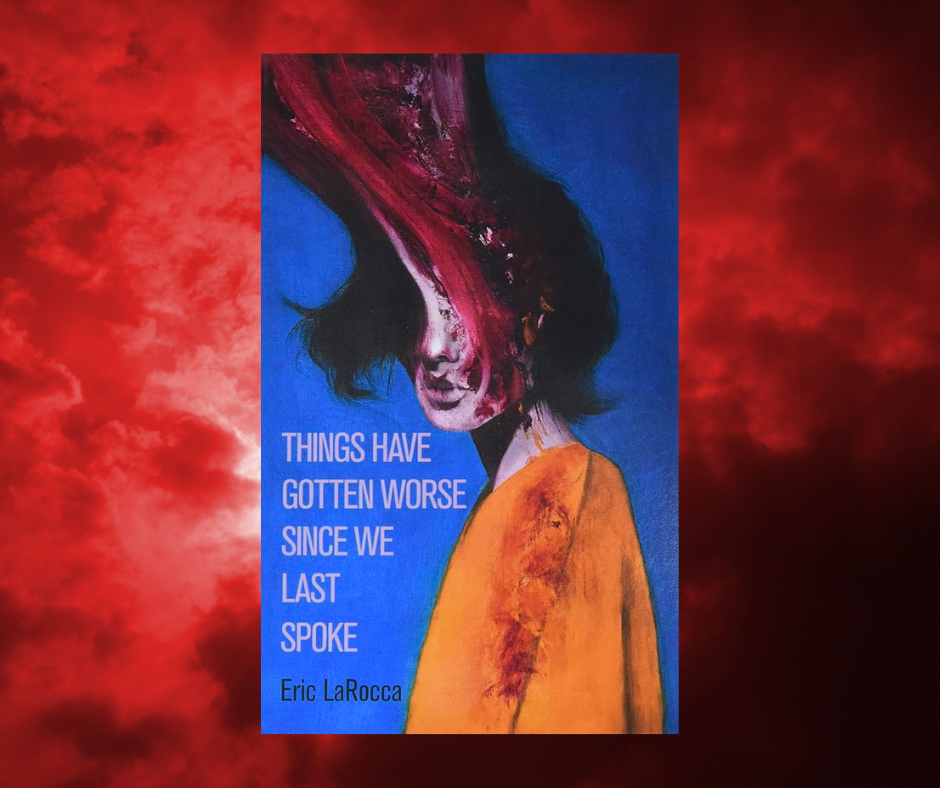Safe, sane, and consensual: these are the last words anyone would possibly use to describe Eric LaRocca’s novella Things Have Gotten Worse Since We Last Spoke. Even without the objectively disgusting twist in the last act–which is largely responsible for the novella’s gristly, “endurance test” reputation– the under negotiated terms of the central dom/sub relationship creates enough tension for the reader to endure. However, the reduction of Things Have Gotten Worse to just its (rightfully) infamous final act does a disservice to the narrative of lesbian isolation in the early Internet era.
The novella reads as a fictionalized court record, preserving a long thread of instant messages and emails between two women engaged in an online relationship: Zoe, the woman on trial, and Agnes–her now-deceased lover. What makes the narrative and abrupt end to Things Have Gotten Worse Since We Last Spoke work so effectively is the fleshed-out development of the central couple’s relationship. Throughout their emails and IM exchanges, the audience becomes privy to both women’s insecurities and desires which guide their friendship and eventual dom/sub relationship. Both women, despite being grown with established careers, still harbor a childish naivete when it comes to relationships. Clearly neither woman holds a firm grasp on not just what a dom/sub relationship entails, but what a normal romantic relationship entails.
The apparent naivete of both women comes from an obvious lack of experience. These women live in the Don’t Ask, Don’t Tell era of queerness in the United States, and neither live by an operating lesbian bar (I checked). Both Agnes and Zoe are repressed, in every way that matters, and it’s heavily implied that Agnes was disowned by her parents and sent to live with an abusive aunt after coming out. Since its inception, the Internet provided larger, wider-reaching queer spaces with a level of protection–anonymity–that real world communities couldn’t reach. Agnes and Zoe recognize the opportunity that an online “relationship” provides for them, but utilize the semi-anonymity of the Internet in two very different yet equally destructive ways.
From the very start the relationship is transactional with the point of first contact being Zoe’s inquiry about purchasing an heirloom apple peeler from Agnes. Although the peeler purchase never goes down, the heavy emphasis on give-and-take remains in their relationship. The central ethos of the couple’s contract is “have you earned your eyes today?”: a promise to push boundaries and overcome insecurities to live a fuller life. This promise only goes one way as Zoe never has to earn her eyes, her sole self-appointed responsibility is forcing Agnes to earn her eyes. Considering Agnes’ background, which she is all too willing to provide to a stranger exhibiting the slightest hint of positive attention, her manipulation into an under negotiated online dom/sub relationship is both unsurprising yet horrifying.
Beyond the absolute downer ending, which proved to be quite divisive, Agnes and Zoe’s relationship in Things Have Gotten Worse Since We Last Spoke was doomed from the start. It’s less outright horrific and more a mediation on queer isolation in the early Internet age. Agnes’ desperation for queer connection and Zoe’s weaponization of the semi-anonymous capabilities of chatrooms and message boards set the stage for a violent implosion well before anything outwardly horrific occurred. While the application of the “lesbian suffering for the sake of suffering” moniker feels a bit reductive, definitely do not approach Things Have Gotten Worse expecting a moment of peace.
Rating:

Red Broadwell is a first-year film studies MA student at the University of North Carolina Wilmington. Their other work can be found at https://redbroadwell.journoportfolio.com
–
Thanks for reading! Interested in being featured as a guest blogger? Pitch us your review or think piece on queer horror!
Stay spooky!
💀🏳️🌈🔪
